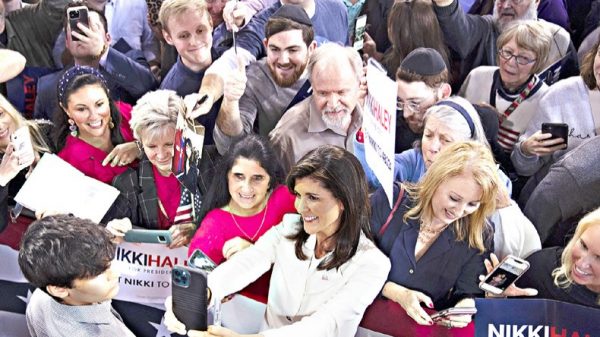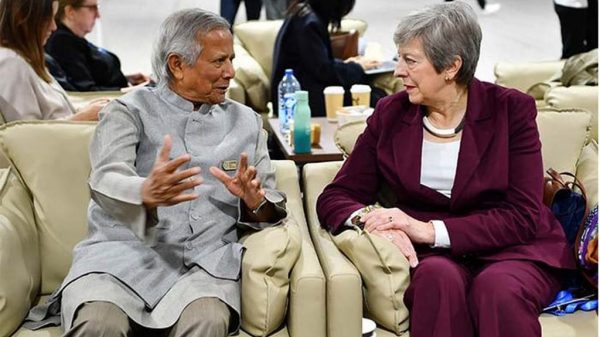China bashing: Nikki Haley’s new mantra

Imran Khalid:
IT APPEARS that in western election campaigns, criticising China has become a convenient and effective tactic for winning votes. Nikki Haley, a former governor of South Carolina and US ambassador to the UN who is now competing with Donald Trump for the GOP presidential nomination, has launched a highly aggressive campaign against China. On February 27, she tweeted, ‘Covid-19 likely came from a Chinese lab. Cut US aid. Not a cent to Communist China.’
This tweet is surprising coming from someone who has represented her country at the UN and is now vying to become the world’s most powerful person. It suggests that either she is unaware of the US’s debt status or she deliberately wants to portray China as a debtor. By tweeting such things, she seems to have overlooked the fact that the situation is actually the opposite: the US owes billions of dollars to China.
Nevertheless, this tweet is just one part of her ongoing series of attacks against China. Last week, in an op-ed article in the New York Post, Nikki Haley made a smearing attack on China, whom she considers the enemy of the United States. In her article, she declared that, if voted to power, she would cut every cent in foreign aid to countries that hate the US. This includes China, Pakistan and other countries, as ‘a strong America doesn’t pay off the bad guys’.
‘American taxpayers still give money to Communist China for ridiculous environmental programmes, despite the obvious threat China poses to Americans,’ she wrote in her article. ‘That’s why I will cut every cent in foreign aid for countries that hate us… We are giving huge amounts of cash to countries that vote against us most of the time. That doesn’t make sense. I’ll stop it. America can’t buy our friends. We’ll certainly never buy off our enemies,’ she further wrote in the last paragraph of her op-ed piece.
Similarly, a few days ago, speaking at her first rally in Charleston, South Carolina, Nikki displayed her antagonism towards China in very offensive language. She claimed that under her leadership, ‘Communist China will end up on the ash heap of history… like the Soviet Union before it.’ These are perhaps one of the harshest words used by any of the American leaders in recent history against China. Laced with a thick glaze of disinformation and bigoted mentality, Nikki Haley’s barrage of anti-China rhetoric is a reflection of the malaise that has seeped into American thinking towards China.
Nikki’s tirade against China at this early stage of her Republican nomination campaign reflects a chronic problem with American politics. America’s foreign policy is too dependent upon the presence of a real or imaginary enemy to engage the voters and distract their attention from the existing problems at home and simmering cultural degeneration. During the Cold War era, the threat from the Soviet Union was used to huddle the American allies together against a common enemy — the Soviet Union — as well as to keep the American public engrossed in a perpetual fear of war.
After the demise of the Soviet Union, the Americans created a new enemy, Islamic fundamentalism, to fill the void created by the removal of the Soviet Union. And now, sensing that Islamic jihad has failed to nurture the required ‘threat culture’ in the United States, the policy makers in Washington are consciously working on creating a new imaginary villain — China — to quench their psychological thirst for an enemy. Like many other US politicians, Nikki is casting her eyes on the other side of the globe while turning a blind eye to US domestic decay. It appears that she has been deeply influenced by the tactics of Donald Trump, who resorts to such irritating and inflammatory stuff to keep engaging his target audience.
Following in the footsteps of her main rival, Donald Trump, she has been deliberately playing the China card to attract voters — a trend that is now fast becoming vogue in the domestic politics of most western countries. We witnessed similar China-bashing by Liz Truss and Rishi Sunak in the UK when both were competing for the top slot of the Tories. Rishi Sunak was particularly insolent in his campaign speeches towards China. Nikki Haley is also playing to the same tune because she thinks it is the most marketable proposition in the United States to win the voters’ support.
Obviously, such a blunt and offensive comment attracted a severe reaction from Beijing — and more airtime for Nikki in the electronic and social media. Such a pattern in American politics is very harmful for the overall evolution of political culture there. Particularly at a time when American politics is also gearing up for a shift from octogenarian politicians to a relatively younger cohort of politicians, such an infusion of anti-China sentiment will have a very damaging impact in the long run. Nikki Haley may not be able to win her bid for the White House, but she is adding more acrimony and bitterness in the American mind through her petty political selfishness. The deliberate efforts to bracket China as ‘evil’ will inversely harm American interests in the global arena.
The campaign will not stop here. Once the race for the presidential nominations heats up, we may witness more episodes of the China hysteria in American politics. Reflective of a planned campaign to create a Cold War atmosphere in America, both sides of the political divide in the US are frantically trying to outdo each other in this new kind of electoral wrangling, which is being fought on the basis of maligning an imaginary enemy rather than focusing on domestic issues. This new vogue of China-bashing, which was actually given new impetus by Donald Trump ever since he kicked off his 2016 presidential campaign, will certainly add more fuel to the already soured Sino-US ties.
Dr Imran Khalid is a freelance contributor from Karachi.























Leave a Reply